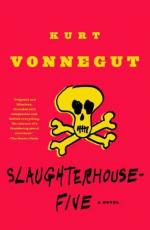|
|
Slaughterhouse-Five Topic Tracking: Death
Chapter 1
Death 1: The narrator visits Dresden, and comments that Dresden must have a lot of bone meal in the ground. He says the phrase, "So it goes," for the first time in the book. He will proceed to say this after every single mention of death, from soldiers to bacteria.
Death 2: The narrator comments that the war made everyone tough, especially the women who took over for men's jobs. While working as a reporter for the Chicago City News Bureau, the narrator once covered a story about a man who had been crushed by an elevator after his wedding ring got snagged. So it goes. He recounted the story to the stenographer, and she said nonchalantly that she had seen worse in the war.
Death 3: The narrator tells his publisher that he cannot write a book entirely about Dresden because there is nothing intelligent to say about a massacre, for everyone is dead. So it goes.
Death 4: The narrator compares himself to Lot's wife, who was turned into a pillar of salt when she turned and looked back at the destruction of the city. So it goes. He says that what he wrote about the war was written by a pillar of salt.
Chapter 2
Death 5: The narrator announces the death of Billy's father bluntly. So it goes. There is never any emotional response elaborated.
Death 6: The narrator announces the death of Billy's wife matter-of-factly and without much tact. So it goes. He never elaborates on any possible emotional response by Billy, though his daughter Barbara does grieve.
Death 7: The narrator explains the phrase, "So it goes." It is the Tralfamadorian response to death, for on Tralfamadore, people only appear to die. They know, though that he is still alive in the past; all moments of past, present, and future are always alive. When they see a corpse, they think that the person is in bad shape at that moment.
Death 8: Billy is in South Carolina when his father dies. So it goes. Again, the death of Billy's father is mentioned emotionlessly.
Death 9: Billy is confronted with old age and death when he visits his mother in the nursing home. She asks him painfully how she got so old, and he sees the dead body of an old man who used to be a famous runner. So it goes.
Chapter 3
Death 10: Wild Bob, the colonel who addressed Billy, thinking he was addressing his troops, is a brave figure who dies a pathetic death as a delirious prisoner of war. So it goes.
Chapter 4
Death 11: The narrator described the prisoners in the boxcars as a liquid which would flow out of the cars toward coolness and light. The hobo cannot flow because he is a solid, dead. So it goes.
Chapter 6
Death 12: Paul Lazzaro, a vengeful, weak, rotting man, blames Billy for Weary's death and threatens to have him shot to avenge his friend.
Death 13: Because Billy can become unstuck in time, he has already seen that he will die from being shot in the head at a rally. So it goes. He speaks at the rally, telling them the Tralfamadorian wisdom, and tells them that he will die, but only for a little while, and that if they protest, they have learned nothing from him.
Chapter 7
Death 14: Because Billy has seen the future, he knows that the plane will crash and only he will survive. So it goes. He does not say anything because he does not want to cause a scene and knows people would think he was a fool.
Chapter 8
Death 15: Billy sees Dresden after the bombing and it is so barren and uneven that he refers to it thereforward as the moon. Everyone is dead. So it goes.
Chapter 9
Death 16: Billy's wife Valencia dies of carbon monoxide poisoning on the way to see him in the hospital after the plane crash. So it goes. It was foreshadowed in the beginning of the book, and there is never any emotional response to it.
Death 17: Death surround the narrator, from the deaths of Robert Kennedy and Martin Luther King, to the rising death tolls in Vietnam, to the death of his own father, and to this, he responds: So it goes. He clarifies, though, that his father died of natural causes.
Death 18: Billy and the other prisoners are made to dig up corpses from the ruins of Dresden, where everyone has died. So it goes.




